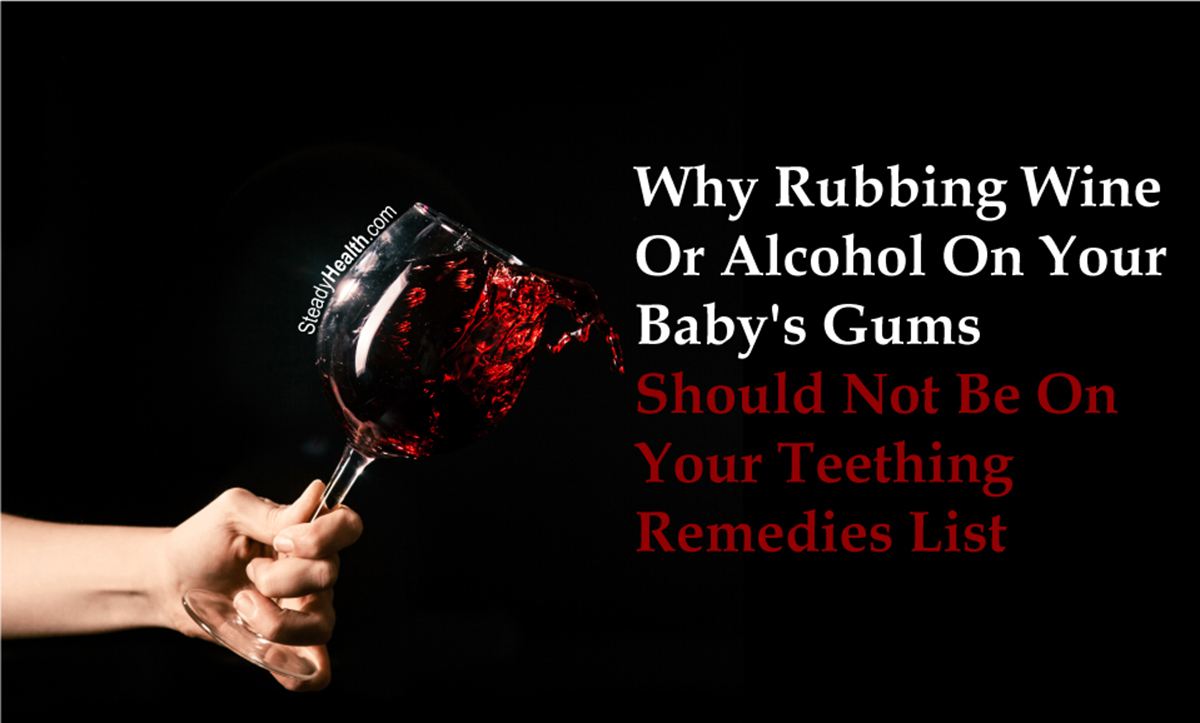Even though all children must go through the teething process, it is still one of the most common parental concerns. Teething usually starts around six months of age with symptoms such as increased drooling and biting, irritability, sleep disturbances, ear pulling and rubbing, decreased appetite, and a slight increase in body temperature [1]. Some of the symptoms often attributed to tooth eruption are inaccurate, making parents expose their infants to risky and mostly ineffective teething remedies. [2]

Dangers of using alcohol for baby teething
Folk remedy use is still quite common, perhaps even a universal thing. In a study published in the American Academy of Pediatrics (AAP), whiskey was the third most common folk remedy for teething pain (with 34.6 percent of respondents using it). Most respondents have heard about this remedy from their mothers, claiming it numbs the gums, relieves the teething discomfort, and makes the baby sleepy. [3]
No amount of alcohol is safe for a baby, so we should resist any urges to follow the old folk habits. Studies have shown that even prenatal consumption of alcoholic beverages can cause developmental delays and a variety of behavioral changes. Prenatal alcohol exposure is connected with intellectual deficits, including lack of attention, cognitive flexibility, and difficulties utilizing feedback to modify previously learned behavior. [4, 5]
Here's a fact – you rarely hear older kids complain how cutting teeth hurts, so why do we assume that all intense baby's cries are for this reason? It's a new world full of new sensations, this alone can be a reason to cry.
Wine is fine to use to ease the teething discomfort, but only if the glass is for you and you're not breastfeeding (at least in the next couple of hours), as alcohol may have a negative effect on your breastfed baby. The AAP recommends not more than 0.5 g of alcohol per kilo of body weight. For a 60 kg woman (around 130 lbs), this would mean two beers. [6, 7]
Is rubbing alcohol safe as a teething remedy?
Isopropyl (rubbing) alcohol has been on the list of popular folk remedies for teething pain and reducing fever, but this is not a good idea as it can cause alcohol poisoning, induce coma, and cause number of other medical complications, including death. [8]
It can be effective in reducing fever as it temporarily cools the skin as it evaporates, but on the other hand, it's just for a short period, and cooling the body too fast may be counterproductive. If a child starts to shiver, it's a signal to the body to raise the temperature again, and what did you achieve?
The Internet can be a dangerous place
You wouldn't believe what kind of advice some parents (mostly mothers) are sharing on social media and forums of some major parenting websites. From „my parents would occasionally give me a teaspoon of whiskey as a kid to warm me up during winters“ to „my mother rubbed my gums with wine and I turned fine“.
Did you really? It’s shocking that parents would put bourbon or whiskey in a baby's bottle to make her warm or sleepy, and one mother was recently charged with doing exactly this to her teething baby.
This practice has, fortunately, become a bit less popular lately, but treating teething pain with wine, whiskey, or rum is still around. It should be a no-brainer that same as you shouldn't drink while pregnant or breastfeeding, you definitely shouldn't be giving alcohol to your developing child! Alcohol might help to relax both baby and parents through the night because it'll numb the gums and make a baby sleepy, but baby's tiny liver is not ready to process alcohol, and it can be toxic even at low doses. [9]
Here's more on the teething remedies you should never give to your baby.
- Photo courtesy of SteadyHealth.com


Your thoughts on this